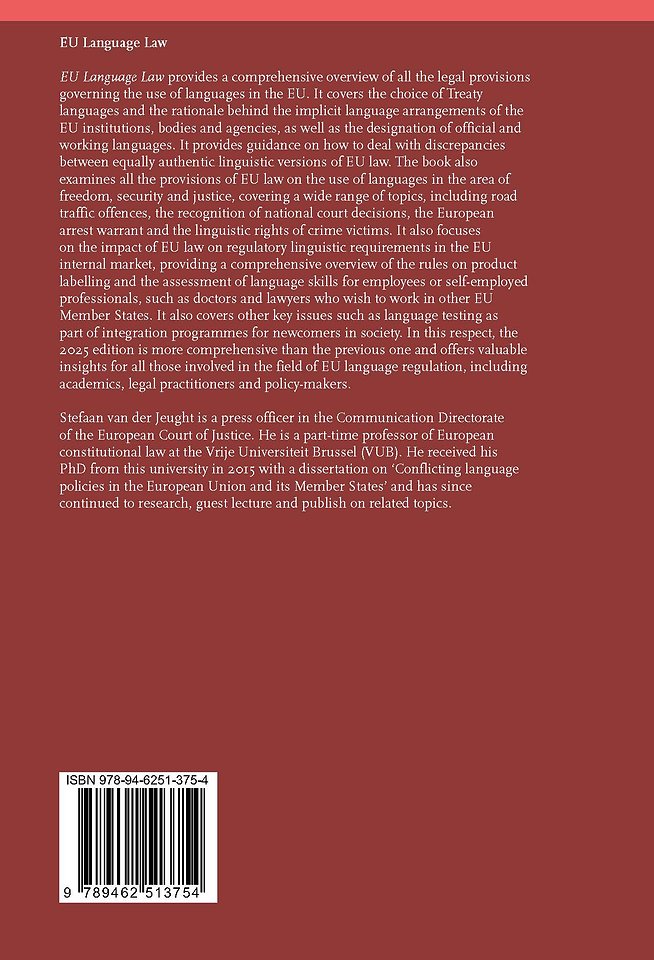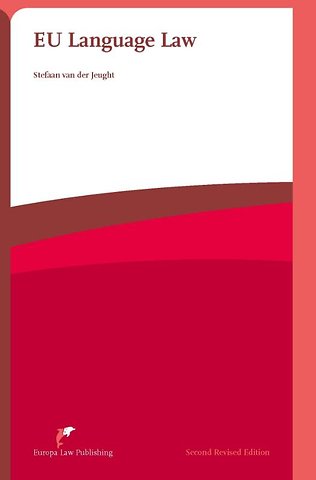



Stefaan van der Jeught is a press officer in the Communication Directorate of the European Court of Justice.
Meer over Stefaan van der JeughtEU Language Law
Samenvatting
EU Language Law provides a comprehensive overview of all the legal provisions governing the use of languages in the EU. It covers the choice of Treaty languages and the rationale behind the implicit language arrangements of the EU institutions, bodies and agencies, as well as the designation of official and working languages. It provides guidance on how to deal with discrepancies between equally authentic linguistic versions of EU law.
The book also examines all the provisions of EU law on the use of languages in the area of freedom, security and justice, covering a wide range of topics, including road traffic offences, the recognition of national court decisions, the European arrest warrant and the linguistic rights of crime victims. It also focuses on the impact of EU law on regulatory linguistic requirements in the EU internal market, providing a comprehensive overview of the rules on product labelling and the assessment of language skills for employees or self-employed professionals, such as doctors and lawyers who wish to work in other EU Member States. It also covers other key issues such as language testing as part of integration programmes for newcomers in society.
In this respect, the 2025 edition is more comprehensive than the previous one and offers valuable insights for all those involved in the field of EU language regulation, including academics, legal practitioners and policy-makers.
Trefwoorden
Specificaties
Inhoudsopgave
Acknowledgements
Contents
PART I Setting the scene: what is language law?
I Linguistic diversity throughout history
II Traditional aims of the regulation of language use
1 National unity and social cohesion
2 Protection of linguistic minorities and Language diversity
III Scope of the regulation of language use
1 Variatio delectat: a great variety
2 State sovereignty as to official language use
3 Private Freedom of language
4 The crucial great divide between public and private spheres
IV Classification of the language policies of the EU Member States
1 A patchwork of monolingualisms
2 Single official language policy
3 Single official language policy with territorial exceptions
4 Multiple official language policy
V Summing up: what is language law?
PART II Language law of the European Union
I Historical overview
1 The European Coal and Steel Community (1951)
2 The European Economic Community and the European Atomic Energy Community (1957)
3 The European Union (1992)
4 Some concluding remarks: pragmatism rules
II Aims of EU language policy
1 Language equality and non-discrimination
2 European integration and mobility
3 The integration aim in the case law of the Court of Justice
4 Linguistic diversity
5 Protection of linguistic minorities
III Scope of EU language policy
1 The scope of EU language policy is comparable to that of national policies
2 Limits of the scope of EU language policy
IV EU public language policy
1 EU Treaty languages
2 EU official and working languages
3 Restricted language regimes and practices
4 Special language regime of the Court of Justice of the European Union
5 The area of freedom, security and justice
V EU private language policy
1 Regulatory linguistic requirements as to the free movement of goods
2 The situation of migrating professionals in the EU internal market
3 Certified translations of documents
4 Broadcasting licences
5 Other preferential language policies
PART III A ten-point roadmap for a more coherent EU language policy
I The curse of languages: a democratic debate is long overdue
II Honesty is the best policy: transparency on the extent of multilingualism
III Some languages are more equal than others: provide for a legal basis and… embrace English officially?
IV Get real: EU multilingualism policy is self-defeating
V The multilingualism paradox as to the law in 24 languages
VI A clearer demarcation of competences between the EU and its Member States
VII The protection of linguistic minorities
VIII The issue of social cohesion and the importance of (a common) language
IX The paradox of multilingual EU Member States
X EU language policy needs a coherent framework
Epilogue: Coming to grips with the past
Bibliography
Table of cases
Index
Anderen die dit boek kochten, kochten ook
Rubrieken
- cadeauboeken
- computer en informatica
- economie
- filosofie
- flora en fauna
- geneeskunde
- geschiedenis
- gezondheid
- jeugd
- juridisch
- koken en eten
- kunst en cultuur
- literatuur en romans
- mens en maatschappij
- naslagwerken
- non-fictie informatief/professioneel
- paramedisch
- psychologie
- reizen
- religie
- schoolboeken
- spiritualiteit
- sport, hobby, lifestyle
- thrillers en spanning
- wetenschap en techniek
- woordenboeken en taal





